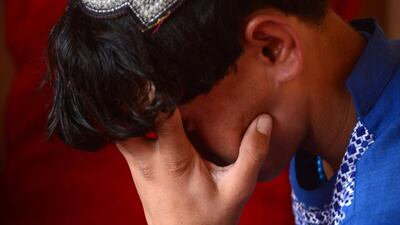Lashkar Gah, Afghanistan // Quivering with rage, Shirin holds a photo of his teenage brother-in-law, who now lives as the plaything of policemen after being abducted from his home in southern Helmand earlier this year.
Shirin recalled how the 13-year-old screamed and writhed as he was taken away by a police commander.
“When I begged for his release, his men pointed their guns and said: ‘Do you want your family to die? Forget your boy’,” he said.
Shirin’s brother-in-law is just one victim of a hidden epidemic of kidnappings of young boys for institutionalised sexual slavery in Afghanistan. Known as “bacha bazi”, the culturally sanctioned exploitation is also carried out by western-backed Afghan security forces.
A report by Agence France-Presse in June revealed how Taliban insurgents were exploiting bacha bazi in police ranks to mount deadly insider attacks. The report, denied by the insurgents, prompted an Afghan government investigation.
“Our boys are openly abducted for bacha bazi. Where should we go for help? The Taliban?” Shirin asked.
A common theme in the testimonies from families whose children have been abducted by police is helplessness. Once taken captive, the boys can be shuffled among police checkpoints, complicating efforts to trace them.
Sometimes they are spotted in the open as policemen flaunt their spoils. For fathers like Sardarwali, the crushed hope of such an encounter is almost too much to bear.
After months of fruitless searching, he caught a glimpse of his kidnapped son in a crowded marketplace in Helmand’s Gereshk district. The child was dressed in a fine embroidered tunic and wore a bejewelled skull cap.
Sardarwali was desperate to reach out to his son, but did not dare approach the bevy of policemen that surrounded him.
“I watched him disappear into the distance,” Sardarwali said.
“His mother is crazed with grief. She cannot stop crying: ‘We have lost our son forever.’”
Parents’ agony of losing a child to sexual slavery is compounded by concerns that in captivity their boys will become addicted to the opiates some are given to make them submissive. Worse still, many fear they could be taken to reinforce front lines, where police are suffering record casualties in their fight against the Taliban.
Still, some families take grim solace in the knowledge they are not alone: their villages are full of bacha bazi victims, many discarded when their beards begin to show.
Bacha bazi has seen a chilling resurgence in post-Taliban Afghanistan, where it is not widely perceived as homosexual or un-Islamic behaviour.
Young boys dressed effeminately have an ornamental value in a society where the genders are strictly segregated. Their possession is a mark of social status, power and masculinity.
The practice has spurred a violent culture of one-upmanship within police ranks, as officers jealously compete to snatch the most beautiful boys, said a former top Helmand security official.
“Often the only escape for enslaved bachas is to make a deal with the Taliban: ‘Liberate me and I will help you get my abuser’s head and weapons’,” the official said, referring to insider attacks.
The Afghan government has said it has zero tolerance for child abusers in security ranks.
But Dost Mohammad Nayab, a spokesman for the government of Uruzgan province, acknowledged that nearly every provincial checkpoint had a bacha.
He fears any move to extricate them could see angry policemen abandoning their posts, paving the way for the Taliban.
“It is difficult to separate policemen from their bachas in this security situation,” Mr Nayab said, explaining that police serve as a crucial first line of defence against insurgents.
Helmand activist Sardar Hamdard said the practice had undercut public support for Afghan forces, enabling the Taliban to exploit it as a recruitment tool.
“Rampant bacha bazi is ruining our society,” Mr Hamdard said.
* Agence France-Presse

